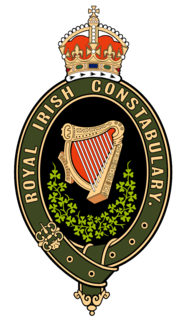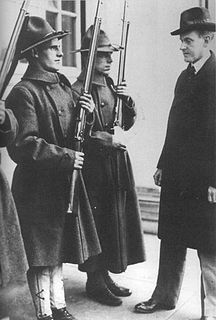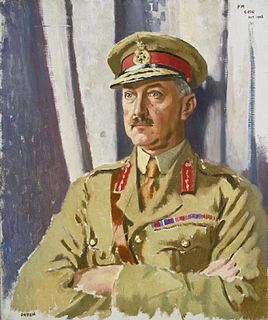
The Royal Irish Constabulary was the police force in Ireland from 1822 until 1922, when all of the country was part of the United Kingdom. A separate civic police force, the unarmed Dublin Metropolitan Police (DMP), patrolled the capital and parts of County Wicklow, while the cities of Derry and Belfast, originally with their own police forces, later had special divisions within the RIC. For most of its history, the ethnic and religious makeup of the RIC broadly matched that of the Irish population, although Anglo-Irish Protestants were over-represented among its senior officers.
Chief constable is the rank used by the chief police officer of every territorial police force in the United Kingdom except for the City of London Police and the Metropolitan Police, as well as the chief officers of the three 'special' national police forces, the British Transport Police, Ministry of Defence Police, and Civil Nuclear Constabulary. The title is also held by the chief officers of the principal Crown Dependency police forces, the Isle of Man Constabulary, States of Guernsey Police Service, and States of Jersey Police. The title was also held, ex officio, by the president of the Association of Chief Police Officers under the Police Reform Act 2002. It was also the title of the chief officer of the Royal Parks Constabulary until this agency was disbanded in 2004.
The 1923 Victorian Police strike occurred in Melbourne, Victoria, Australia. On the eve of the Melbourne Spring Racing Carnival in November 1923, half the police force in Melbourne went on strike over the operation of a supervisory system using labour spies. Riots and looting followed as crowds poured forth from Flinders Street railway station on the Friday and Saturday nights and made their way up Elizabeth and Swanston Streets, smashing shop windows, looting, and overturning trams.

Boston police officers went on strike on September 9, 1919. They sought recognition for their trade union and improvements in wages and working conditions. Police Commissioner Edwin Upton Curtis denied that police officers had any right to form a union, much less one affiliated with a larger organization like the American Federation of Labor (AFL), which some attribute to concerns that unionized police would not protect the interest of city officials and business leaders. Attempts at reconciliation between the Commissioner and the police officers, particularly on the part of Boston's Mayor Andrew James Peters, failed.

The Police Federation of England and Wales (PFEW) is the statutory staff association for police constables, sergeants, inspectors and chief inspectors in the 43 territorial police forces in England and Wales. Under UK labour law, the police are prohibited from joining ordinary trade unions to defend pay and working conditions, by the Police Act 1996, because of the view that a police strike would pose an exceptional public safety risk. The PFEW was originally established by the Police Act 1919 as an alternative system, which would serve to represent staff, and where disputes could be resolved through arbitration so long as the government continued to bargain in good faith.
The Limerick Soviet was one of a number of self-declared Irish soviets that were formed around Ireland circa 1919. The Limerick Soviet existed for a two-week period from 15 to 27 April 1919. At the beginning of the Irish War of Independence, a general strike was organised by the Limerick Trades and Labour Council, as a protest against the British Army's declaration of a "Special Military Area" under the Defence of the Realm Act, which covered most of Limerick city and a part of the county. The soviet ran the city for the period, printed its own money and organised the supply of food. The Limerick Soviet was one of a number of Irish soviets declared between 1919 and 1923.

Brigadier-General Sir William Thomas Francis Horwood, was a British Army officer who also served as Commissioner of Police of the Metropolis, head of London's Metropolitan Police, from 1920 to 1928.

General Sir Cecil Frederick Nevil Macready, 1st Baronet,, known affectionately as Make-Ready, was a British Army officer. He served in senior staff appointments in the First World War and was the last British military commander in Ireland, and also served for two years as Commissioner of Police of the Metropolis in London.
The POA: The Professional Trades Union for Prison, Correctional and Secure Psychiatric Workers, also known as the Prison Officers' Association (POA), is a trade union in the United Kingdom. It currently has a membership over 30,000.

The River Tyne Police was a police force established under the Newcastle upon Tyne Port Act 1845 which patrolled the River Tyne in England between 1845 and 1968.
The Alberta Union of Provincial Employees (AUPE) is a Canadian trade union operating solely in the province of Alberta. With approximately 95,000 members as of March 2019, it is Alberta's largest union.
The National Federation of Discharged and Demobilised Sailors and Soldiers (NFDDSS) was a British veterans organisation.
A special constable or special police constable is generally an auxiliary or part-time law enforcement officer.
Liverpool Parks Police was a police force maintained by the Corporation of Liverpool to police the parks and open spaces owned by the city. The first record of "park constables" in Liverpool is from 1832, although members of the force were not sworn in as constables in their own right until 1882. The force was disbanded in 1972.

John Henry Hayes was a British police officer, trade unionist and politician. After serving in the Metropolitan Police, he became general secretary of the National Union of Police and Prison Officers. In 1923, he became the first Labour Member of Parliament in Liverpool when he was elected to represent Edge Hill. From 1929 to 1931, he served in government as Vice-Chamberlain of the Household.
Florence Mildred White was an English policewoman. She was likely to have been the first documented woman to join a police force in England and Wales, and to be attested immediately as a Constable. Later she was to become the first attested woman officer holding the rank of Inspector, and the first woman police officer to receive a pension on retirement.
The 1928 New Year Honours were appointments by King George V to various orders and honours to reward and highlight good works by citizens of the United Kingdom and British Empire. They were announced on 30 December 1927.
The 1929 New Year Honours were appointments by King George V to various orders and honours to reward and highlight good works by citizens of the United Kingdom and British Empire. They were announced on 26 February 1929. The announcement of the list was delayed two months by the health of the king, who fell ill with septicaemia in November 1928. There were no recipients of the Royal Victorian Order and only two recipients in the military division of the Order of the British Empire.
The 1932 New Year Honours were appointments by King George V to various orders and honours to reward and highlight good works by citizens of the United Kingdom and British Empire. They were announced on 29 December 1931.
Women in policing in the United Kingdom began as early as December 1915 amidst the First World War. As with other countries, police forces in the UK were entirely male at the start of the 20th century. Their numbers were limited for many decades, but have gradually increased since the 1970s. In England and Wales, 31.2% (40,319) of police officers were female on 31 March 2020. Previously, women police made up 28.6% in March 2016, and 23.3% in 2007. Women also make up a majority of the non-sworn police staff. Notable women in the police forces include Cressida Dick, the former Commissioner (chief) of the Metropolitan Police Service.







